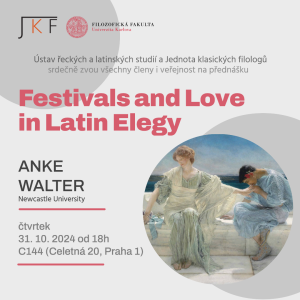Anotace: Festivals can provide a time for love, or they can get in the way of an amorous relationship. In Latin elegiac poetry, festivals interact with the elegiac programme of different authors in intriguing ways that have not yet attracted the attention they deserve. In my talk, I will explore how Tibullus creates a clear dichotomy between his festive poems and his amatory elegies, building up a contrast between the bright, cheerful atmosphere of festivity and the amatory poems that mourn the lack of success of the poor poet. These different, yet interconnected poetics allow the poet to comment on contemporary festive culture and its flipside that, he seems to suggest, is too often left out of the public discourse, although both are equally sanctioned by an ‘Apolline’ poetic programme that Tibullus represents. Propertius continues along similar lines when, in his fourth book of elegies, he uses festivals, such as that of Hercules Invictus in 4.9, to question the public commemoration connected with this important Augustan festive day. I will end with an elegy from the pseudo-Tibullan corpus (3.8), some of whose poems focus on and have been attributed to a female poet, Sulpicia. Here too, we can trace yet another re-interpretation of a festival, that of the Matronalia, for an elegiac poet’s own, amatory ends. Festivals, we can conclude, are a powerful and multi-layered literary phenomenon that allows poets to reflect on their society and their own poetry in ever new ways.

